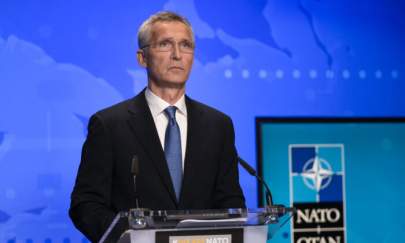NATO Shares Concerns Over Beijing’s ‘Coercive Policies, Expanding Nuclear Program’
NATO Secretary General Jens Stoltenberg has urged the People’s Republic of China (PRC) to be transparent about its expanding nuclear arms program during a meeting with State Councilor and Minister of Foreign Affairs Wang Yi.
The NATO secretary general and the PRC foreign minister connected during a virtual meeting on Sept. 27 where they discussed NATO-China relations and current international security challenges, Stoltenberg’s office announced in a statement.
While Stoltenberg made it clear that NATO does not view the PRC as an adversary, he urged Beijing to comply with its international obligations and act responsibly.
Stoltenberg also expressed NATO’s concerns over Beijing’s coercive policies—something that NATO previously expressed back in June when leaders met for a one-day summit in Brussels—as well as the PRC’s lack of transparency on its military modernization.
He also raised concerns over the PRC’s nuclear expansion, which has attracted attention from the United States and the international community this year.
The Washington Post and Federation of American Scientists, an American think tank, disclosed on June 30 and July 26 that the PRC was building hundreds of nuclear intercontinental ballistic missile silos in the desert areas of Gansu Province and near Hami City in eastern Xinjiang.
The PRC also this year introduced its Long March 18 strategic nuclear submarine, which is said to be capable of being equipped with the Julang-3 ballistic missile that has a range of more than 6,200 miles (10,000 kilometers). The Long March 18 has been interpreted by the military experts of the Chinese Communist Party (CCP) as a qualitative leap in sea-based nuclear power.
Numerous officials have warned of Beijing’s ever-increasing nuclear and military capabilities, with former U.S. Secretary of State Mike Pompeo co-authoring an article earlier this year titled “Why China’s Nuclear Build-Up Should Worry the West”, where he claimed that the PRC has historically covered up its nuclear weapons development and that its nuclear arsenal now poses a threat to neighboring countries.
During Monday’s meeting, the NATO secretary general urged Beijing to “engage meaningfully in dialogue, confidence-building, and transparency measures regarding its nuclear capabilities and doctrine” while stressing that this would better serve both NATO and the PRC.
According to the Chinese state media Global Times, Foreign Minister Wang Yi accused NATO member states of frequently deploying aircraft to the Asia-Pacific region and that “the region doesn’t welcome military bloc, major-power confrontation, or Cold War instigators.”
“NATO should adhere to its original geographical positioning and play a constructive role in the peaceful and stable development of the region,” Wang said.
During Monday’s meeting, the secretary general and the foreign minister also discussed developments in Afghanistan, with Stoltenberg calling for a coordinated international approach among countries to make sure the Taliban are held accountable for their actions and commitments on counterterrorism, as well as women’s rights.
According to the press release, Stoltenberg “stressed that NATO Allies went into Afghanistan to ensure the country did not serve again as a platform for terrorists and recalled that no terrorist attacks against our countries had been organized from Afghanistan since 2001.”





